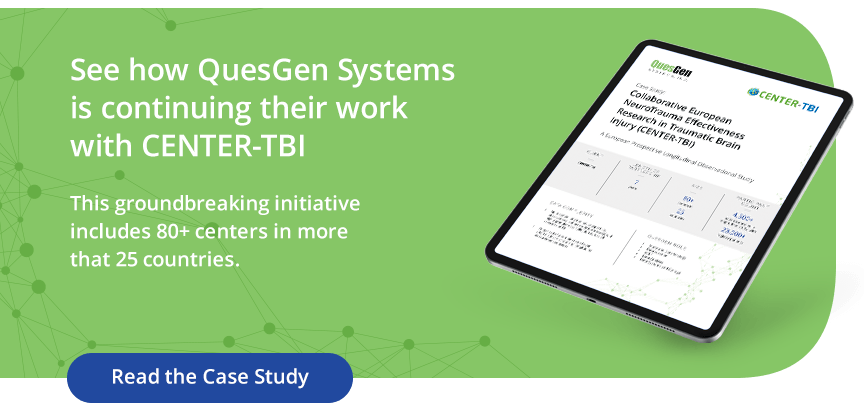TBI Research Lessons: 5 Tips for Managing Complex Data Sets
by Mike Jarrett | Nov 03, 2021 | TBI, Data Management | comments

Longitudinal studies like the ones seen in TBI research come with large, complex data sets.
These studies are hard enough, even without database management! From designing collection methods to staying connected to participants over time – add in their data sets, and the difficulty escalates to another level.
Despite the challenges, studies like the ones seen in TBI research create a massive positive impact on society and the greater human population at large.
QuesGen Systems has managed data from over 125,000 TBI research participants for more than 10 years – helping renowned principal investigators focus on their work’s impact instead of worrying about database management. In working with this large amount of data and managing multiple sites, users, researchers, and more, we’ve derived a set of best practices that continue to guide our work going forward.
Given the growing number of data points that any brain health study can (and will try to) track and measure, we thought it would be helpful to share these lessons for the greater TBI research community.
This list is meant to be a summary of the key lessons learned but it is in no way an exhaustive list. This list will likely continue to grow as the industry evolves!
Best Practices for Conducting and Managing Research with Large Data Sets
#1 Use Consistent Data Models with Industry Standards
The best answer for complexity is consistency. Even from the very beginning, make sure your data models are structured in an optimal and repeatable way. More importantly, ensure your data models align – and comply, where required – with industry standards.
Every field of research has a series of best practices for data management. And TBI research is no different; there are well-documented approaches and best practices for a smooth TBI study. Understand these and apply them to your data models as soon as possible.
#2 Validate Upon Entry and Curate Throughout
With complex data sets, it’s important to validate data upon entry to ensure accuracy and avoid roadblocks once a study is in full swing. It may seem simple but the sooner you validate data, the more time and money your group will save.
There are countless scenarios in TBI research where you can (and should) make rules for complex validation processes. From validating height based on athlete body weight to filtering by military cadet gender, the possibilities are endless. Set it up correctly in the beginning with a platform such as QuesGen and your future organization will be more straightforward.
And once you’ve validated the data, don’t overlook curation.
There’s a saying in data management: “Curate early, curate often.”
With any large brain health study – whether academic or commercial – organizing and managing your collection of data sets throughout the study is a must. The size and scope of most data sets demand continual data curation.
#3 Understand Your Data Sharing Requirements
Data sharing requirements for brain health studies should be factored in during the initial planning phase.
In TBI studies that receive NIH funding, for example, the data must be shared with the FITBIR (Federal Interagency Traumatic Brain Injury Research) Informatic System. Systems such as FITBIR exist to advance progress in a specific research area through shared data and re-analysis.
This can be a time-consuming and difficult process to manage, so make sure the database management platform you select includes FITBIR data sharing. QuesGen is the clear leader with over a decade of experience and unmatched expertise. In fact, QuesGen supported TRACK-TBI – a leading TBI study with over 3,700 participants across the United States – in making their pilot dataset the first to populate the FITBIR repository.
#4 Foster a Culture of Collaboration
Principal investigators (PIs), co-PIs, and participants for longitudinal brain health studies span far and wide. Foster a culture of collaboration and establish a system for making everyone feel part of the team.
This could be a tech-enabled communication system, where most of the team can chat in real-time. It could also be a collaborative management system, where certain contributors can work on the same tasks from anywhere and use the same SOPs. All contributors must work together – across different environments and areas of expertise – to effectively manage complex data sets.
TRACK-TBI, a long-time partner of QuesGen’s, offers a strong example of this lesson in action. With 18 different sites, the same number of site leads, and over 3,700 participants, fostering a culture of collaboration on the TRACK-TBI study is a must.
Fragmented communications simply would not work; complex studies demand collaborative organization and analysis.
#5 Avoid Significant Pivots in Your Approach
Changes to your study cost time and money – especially when managing complex data sets like the ones involved in TBI research. While pivots are inevitable to some degree, make sure your entire team is firm on the study’s approach before starting.
In the planning phase, call out the areas where there’s a high probability of needing to change direction. And ensure your budget reflects those potential changes. You still can (and probably will need to) pivot, but it’s important to avoid this as much as possible.
Bonus Tip: Make Adequate Investments Upfront
These lessons for managing complex data sets stem from over 10 years of experience working with the largest TBI studies in the world. One of the common mistakes we see across these longitudinal brain health studies – including by the top TBI researchers in the world – is not making adequate investments in research systems in the beginning.
As previously mentioned, these studies are complex, big, and difficult to manage. Your systems must be equipped to handle this. Many studies begin their database management with a low-cost platform, but they quickly learn the volume of data alone will crash this type of system – leaving them without a system and potentially without a budget.
Consider this before your group begins, and budget for the right systems upfront. This way, you can effectively manage your complex data sets, keep your study on track, and continue driving impact through your work.
Learn more about QuesGen’s strength in managing complex data sets.
Read the case study on Center-TBI, the largest TBI study worldwide.
Read more about our impact on TBI research:
● TRACK-TBI Research Profile
● Largest Military TBI Study
● Largest Single-Center Study on Concussions and TBI

